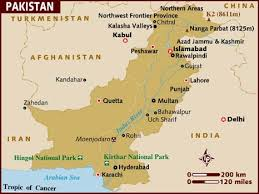 जिया के बाद के पाकिस्तान का अस्तित्व इस्लाम नहीं बल्कि भारत से नफरत है . इसी नफरत ने उसे अपने सिंध के इस्लामीकरण के पहले के इतिहास को झुटलाने के लिए मजबूर कर दिया है . अब मोहन जोदारो व् तक्षिला नहीं बल्कि मुहम्मद बिन कासिम को पाकिस्तान का संस्थापक मानता है . पाठ्यपुस्तकों मैं हिन्दू विरोधी अध्याय धीरे धीरे नफरत को और बढ़ाएंगे . समझदार व्यक्ती बूढ़े होते जायेंगे.
जिया के बाद के पाकिस्तान का अस्तित्व इस्लाम नहीं बल्कि भारत से नफरत है . इसी नफरत ने उसे अपने सिंध के इस्लामीकरण के पहले के इतिहास को झुटलाने के लिए मजबूर कर दिया है . अब मोहन जोदारो व् तक्षिला नहीं बल्कि मुहम्मद बिन कासिम को पाकिस्तान का संस्थापक मानता है . पाठ्यपुस्तकों मैं हिन्दू विरोधी अध्याय धीरे धीरे नफरत को और बढ़ाएंगे . समझदार व्यक्ती बूढ़े होते जायेंगे.
ऐसे मैं पाकिस्तान की सॉफ्टवेर मैं प्रगति भी आणविक प्रगति के समान ही है जिसे पाकिस्तान ने कोरिया व् ईरान को बेच दिया . अब तक विश्व की अधिकतर खतरनाक वायरस पाकिस्तानियों ने बनायीं हैं . वह ज्ञान का सदुपयोग करने मैं असमर्थ हैं .
निम्न लिखित खबर को भारत विरोधि रविय्ये से जोड़ कर पढ़ें .
Pakistan sets up first ‘knowledge hub’ at KU
Karachi, “Latif Ebrahim Jamal National Science Information Center (LEJNSIC), Karachi University (KU), is now launching an open learning program, named ‘LEJ Knowledge HUB’, in Pakistan (and globally as well) that has the potential to change the entire landscape of higher education in Pakistan and the developing world. The inaugural ceremony of the LEJ Knowledge HUB will be held at Sindh Governor House on December 12, 2013, when the 4-day 14th Asian Symposium on Medicinal Plants, Spices and Other Natural Products (ASOMPS) will also be concluded; President of Pakistan, Mamnoon Hussain will inaugurate the country’s great knowledge resource.”
These views were jointly expressed by former Chairman Higher Education Commission (HEC) Prof. Dr. Atta-ur-Rahman, Director International Center for Chemical, Biological Sciences (ICCBS-KU) Prof. Dr. Muhammad Iqbal Choudhary and Chairmn Husein Ebrahim Jamal Foundation Aziz Latif Jamal while speaking at a press conference held at Karachi Press Club here on Friday. It is pertinent to mention here that the entire program is led by our most celebrated scientist and global leader in education, Prof. Dr. Atta-ur-Rahman FRS as a monumental service to the nation and the world at large. Prof. Atta-ur-Rahman said that the vision of the program is to provide an interface for the researchers and reputed institutions from around the world to collaborate, share and enhance their knowledge. An easily accessible treasure chest of unending information is being made available to students, faculty and researchers alike, he maintained. “For this purpose, a program named “LEJ Knowledge HUB” for integrated and open learning. The program includes access to on-line and interactive and recorded courses and mentoring and assessment system. Thousands of full courses (about 0.5 million lecture hours), skill development modules, research based lectures, and on-line mentoring sessions at school, college and university levels have been arranged from the very important sources that included LEJ Courses and Lecture Series, MIT Open courseware (founded by Massachusetts Institute of Technology, USA), Udacity (Harvard), Khan Academy, Open Yale Courses (USA), Stanford Engineering Everywhere (SEE), Virtual University, HEC courses, ICCBS-KU etc. Pakistan is now among the first in the world to initiate a massive learning platform which includes integrated courses from various major world sources for ready accessibility, structured mentoring and assessment system and at the end credit recognition, issuance of certificate, and degrees wherever possible,” he said. Talking about the significance of the Asian Symposium, Prof. Iqbal Choudhary said that a special session is dedicated to commemorate the 50th anniversary of the ASOMPS, which started in 1960 from Peshawar (Pakistan). Moreover, some plenary and keynote lectures will be also arranged through video conferencing. “The program will consist of plenary lectures, keynote lectures, session lectures and poster presentations. Each session will address a theme topic within the area of Medicinal Plants and other Related Natural Products. Special events will be arranged to ensure a lively interaction between scientists and students of natural product chemistry.” The aim of the symposium was to bring together leading experts in the field of natural products sciences all around the world and forge global partnerships for sustainable utilization of natural resources for the common benefit of humanity and rapid development of the countries in the south, he said.
